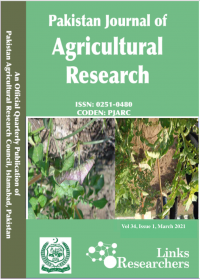ABSTRACT
Mechanical transplanting with mat type nursery is quite a new planting technique for rice. However, optimization of seeding rate for producing mat type nursery is crucial to acquire suitable seedlings and planting density for better yield of mechanically transplanted rice (MTR). Current 2-years field study was conducted to determine effect of seeding rate (80, 90, 100 and 110 g per tray) for preparing nursery mats of fine basmati rice on plant growth, grain yield and economic benefits. Seeding rate significantly affected the growth, yield and related traits of fine basmati rice. Increase in seeding rate from 80 to 110 g per tray successively increased number of plants per tray and per hill after transplanting while decreased the root length and root/shoot ratio of rice. Plant height was not affected significantly by seeding rate. Highest increase in number of productive tillers (8%), 1000-grain weight (8%), total dry biomass (14-17%) and grain yield (10-16%) was caused by 90 g seed per tray, as compared to 110 g seed per tray. Order of grain yield produced by different seeding rates was 90 > 80 > 100 > 110 g per tray. Economic analysis exhibited that maximum net returns and benefit cost ratio (BCR) was achieved by using 90 g seed per tray. In conclusion, 90 g seed per tray improved the grain yield by enhancing number of productive tillers and grain weight of fine basmati rice; hence, could be adopted for better productivity and economic benefits of mechanically transplanted fine basmati rice.
To share on other social networks, click on any
share button. What are these?







